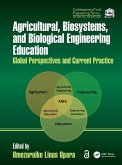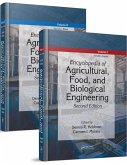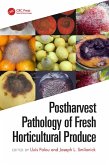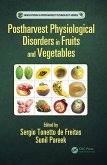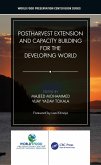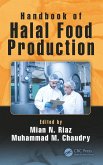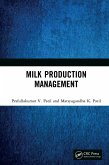Agricultural, Biosystems, and Biological Engineering Education (eBook, PDF)
Global Perspectives and Current Practice
Redaktion: Opara, Umezuruike Linus
205,95 €
205,95 €
inkl. MwSt.
Sofort per Download lieferbar

103 °P sammeln
205,95 €
Als Download kaufen

205,95 €
inkl. MwSt.
Sofort per Download lieferbar

103 °P sammeln
Jetzt verschenken
Alle Infos zum eBook verschenken
205,95 €
inkl. MwSt.
Sofort per Download lieferbar
Alle Infos zum eBook verschenken

103 °P sammeln
Agricultural, Biosystems, and Biological Engineering Education (eBook, PDF)
Global Perspectives and Current Practice
Redaktion: Opara, Umezuruike Linus
- Format: PDF
- Merkliste
- Auf die Merkliste
- Bewerten Bewerten
- Teilen
- Produkt teilen
- Produkterinnerung
- Produkterinnerung

Bitte loggen Sie sich zunächst in Ihr Kundenkonto ein oder registrieren Sie sich bei
bücher.de, um das eBook-Abo tolino select nutzen zu können.
Hier können Sie sich einloggen
Hier können Sie sich einloggen
Sie sind bereits eingeloggt. Klicken Sie auf 2. tolino select Abo, um fortzufahren.

Bitte loggen Sie sich zunächst in Ihr Kundenkonto ein oder registrieren Sie sich bei bücher.de, um das eBook-Abo tolino select nutzen zu können.
This edited book provides the first comprehensive global review and synthesis of different agricultural, biosystems, and biological engineering education approaches, including a detailed exposition of current practices from different regions.
- Geräte: PC
- mit Kopierschutz
- eBook Hilfe
Andere Kunden interessierten sich auch für
![Agricultural, Biosystems, and Biological Engineering Education (eBook, ePUB) Agricultural, Biosystems, and Biological Engineering Education (eBook, ePUB)]() Agricultural, Biosystems, and Biological Engineering Education (eBook, ePUB)205,95 €
Agricultural, Biosystems, and Biological Engineering Education (eBook, ePUB)205,95 €![Encyclopedia of Agricultural, Food, and Biological Engineering (eBook, PDF) Encyclopedia of Agricultural, Food, and Biological Engineering (eBook, PDF)]() Encyclopedia of Agricultural, Food, and Biological Engineering (eBook, PDF)718,95 €
Encyclopedia of Agricultural, Food, and Biological Engineering (eBook, PDF)718,95 €![Postharvest Pathology of Fresh Horticultural Produce (eBook, PDF) Postharvest Pathology of Fresh Horticultural Produce (eBook, PDF)]() Postharvest Pathology of Fresh Horticultural Produce (eBook, PDF)215,95 €
Postharvest Pathology of Fresh Horticultural Produce (eBook, PDF)215,95 €![Postharvest Physiological Disorders in Fruits and Vegetables (eBook, PDF) Postharvest Physiological Disorders in Fruits and Vegetables (eBook, PDF)]() Postharvest Physiological Disorders in Fruits and Vegetables (eBook, PDF)282,95 €
Postharvest Physiological Disorders in Fruits and Vegetables (eBook, PDF)282,95 €![Postharvest Extension and Capacity Building for the Developing World (eBook, PDF) Postharvest Extension and Capacity Building for the Developing World (eBook, PDF)]() Postharvest Extension and Capacity Building for the Developing World (eBook, PDF)49,95 €
Postharvest Extension and Capacity Building for the Developing World (eBook, PDF)49,95 €![Handbook of Halal Food Production (eBook, PDF) Handbook of Halal Food Production (eBook, PDF)]() Handbook of Halal Food Production (eBook, PDF)188,95 €
Handbook of Halal Food Production (eBook, PDF)188,95 €![Milk Production Management (eBook, PDF) Milk Production Management (eBook, PDF)]() Prafullakumar V. PatilMilk Production Management (eBook, PDF)54,95 €
Prafullakumar V. PatilMilk Production Management (eBook, PDF)54,95 €-
-
-
This edited book provides the first comprehensive global review and synthesis of different agricultural, biosystems, and biological engineering education approaches, including a detailed exposition of current practices from different regions.
Dieser Download kann aus rechtlichen Gründen nur mit Rechnungsadresse in A, B, BG, CY, CZ, D, DK, EW, E, FIN, F, GR, HR, H, IRL, I, LT, L, LR, M, NL, PL, P, R, S, SLO, SK ausgeliefert werden.
Produktdetails
- Produktdetails
- Verlag: Taylor & Francis eBooks
- Seitenzahl: 598
- Erscheinungstermin: 30. September 2024
- Englisch
- ISBN-13: 9781439807729
- Artikelnr.: 72272102
- Verlag: Taylor & Francis eBooks
- Seitenzahl: 598
- Erscheinungstermin: 30. September 2024
- Englisch
- ISBN-13: 9781439807729
- Artikelnr.: 72272102
- Herstellerkennzeichnung Die Herstellerinformationen sind derzeit nicht verfügbar.
Umezuruike Linus Opara is a Distinguished Professor at Stellenbosch University, South Africa, where he also holds the Chair of the South African Research Chairs Initiative (SARChI) in Postharvest Technology, and the founding Director of the Africa Institute for Postharvest Technology (AIPhT). He graduated with degrees in Agricultural Engineering (BEng, First Class Honors; MEng, cum laude) from the University of Nigeria, Nsukka, a PhD in Agricultural Engineering from Massey University, Palmerston North, New Zealand and a Certificate in Innovation for Economic Development, from the Executive Education program at Harvard Kennedy School, Harvard University, USA. He is a Chartered Engineer, Certified Food Scientist, and has leading memberships of several professional agricultural engineering societies, including Fellow of the International Academy of Agricultural and Biosystems Engineering, Institution of Agricultural Engineers (UK), South African Institution of Agricultural Engineers, Nigerian Institution of Agricultural Engineers, and Life Membership of the American Society of Agricultural and Biological Engineers, Asian Association for Agricultural Engineering, and the Indian Society of Agricultural Engineers. Prof. Opara is currently developing the UNESCO International Centre for Biotechnology in Nsukka, Nigeria, a Category II Centre under the auspices of UNESCO, for advancing biotechnology research and high-level capacity building in the Africa region in the areas of food security, tropical diseases, and bioresources conservation.
PART 1: HISTORICAL EVOLUTION AND IMPORTANCE OF AGRICULTURAL ENGINEERING
1. Introduction - Revisiting and Rethinking Agricultural and Biosystems/ Biological Engineering Education for Sustainable Development
2. Emergence and Advancement of Agricultural Engineering Education, Research and Practice - A Historical Perspective
3. Agricultural Engineering in the Context of SDGs: A Quest for Global Relevance
4. Top 100 Questions of Importance to the Future of Agricultural Engineering Education, Research, and Practice in Africa
5. Enhancing the Role of Agricultural and Biological Engineering through Education: Perspective from FAO
PART 2: CURRICULA DESIGN AND REFORM
6. Curriculum Design and Application in ABE Education
7. Curricula Design and Reform of Agricultural and Biosystems Engineering (ABE) in EU Member and Candidate States
8. Bioresource Engineering Curriculum and Reform at McGill University, Montreal, Canada
9. Designing Agricultural and Biosystems Engineering Education to Transform Agricultural and Food Systems in Sub-Saharan Africa: Insights from the University of Zimbabwe
10. Reshaping Agricultural and Biosystem Engineering Degree Programs for Student Success and Retention
11. Essential Contextual Knowledge for Agriculture and Biosystems Engineering Education in Low-income Countries
12. Novel Models for Delivering Agricultural and Biosystems Engineering Education in Developing Countries: Trends, Challenges and Future Prospects
13. Current and Future Trends in Agricultural Engineering Education in Nigeria
14. The Need for an Equipment Engineering Course in ABE Education
15. Accreditation Program for Engineering Education in Japan Applicable to Agricultural and Rural Engineering Education
16. Process for Improvement and Evaluation of the Agricultural Engineering Curriculum at the Instituto Tecnológico de Costa Rica
17. Agricultural Engineering Education at Sultan Qaboos University, Sultanate of Oman - Historical Evolution, Curriculum Design and Reform, Students' Perceptions, and Future Prospects
18. Agricultural Engineering Education at Michael Okpara University of Agriculture Umudike, Nigeria
19. Agricultural Biosystems Engineering Education in Indonesia - A Journey
20. Agricultural and Food Engineering Education in Hungary
21. Food Engineering Education in Nigeria
22. Agricultural Engineering Higher Education in Turkey
23. Agricultural and Biosystems Engineering Education in Ghana
24. ABE@Illinois
25. A Profile of Agricultural and Biosystems Engineering Education in Indonesia
26. Evolution and Status of Agricultural and Bioresources Engineering Education at the University of Nigeria
27. Development of the Agricultural and Biosystems Engineering Programme at the Botswana University of Agriculture and Natural Resources (BUAN)
PART 3: PEDAGOGY, EPISTEMOLOGY AND EMERGING TRENDS
28. Developing Faculty Competency for the Delivery of Active Learning Methods
29. Educating the Compleat Biological Engineer
30. Innovation in Bioengineering Education
31. Nomograph-based Models for Introductory Undergraduate Teaching and Research in Selecting Agricultural Power and Machinery Ownership Systems in Developing Countries
32. The Role of Inclusion, Diversity, Equity, and Access (IDEA) in Agricultural and Biological Engineering
33. AgTecCollection - Repository Approach to Rescue Analog Agricultural Engineering Knowledge
34. A Need to Incorporate Intelligent Food Drying Systems in ABE Education - A Recipe for Reducing Global Food Losses and Waste
35. The Need to Incorporate Ergonomics in Smart Agriculture and Organic Farming in Agricultural and Biological Engineering Education
36. CAM-SAM: A Computer-aided Tool for Education and Research on Sustainable Agricultural Mechanization Development
37. Information and Operational Technologies Curricula in Agricultural Engineering Studies
38. Technological-based Resources as Support to Agricultural and Biosystems Engineering studies
39. Present Content and Trial Approaches of Student Experiments for ABEE in Japan
40. Practical Engineering Education to Address Sustainability and Food Security
41. Growing Agricultural Engineering in Africa: Students' Attitudes, Perceptions, and Expectations on Agricultural Engineering Education
42. Prospects for Agricultural and Biosystems Engineering Education and Research for Knowledge-intensive, Data-driven, Climate-smart, and Sustainable Agriculture
1. Introduction - Revisiting and Rethinking Agricultural and Biosystems/ Biological Engineering Education for Sustainable Development
2. Emergence and Advancement of Agricultural Engineering Education, Research and Practice - A Historical Perspective
3. Agricultural Engineering in the Context of SDGs: A Quest for Global Relevance
4. Top 100 Questions of Importance to the Future of Agricultural Engineering Education, Research, and Practice in Africa
5. Enhancing the Role of Agricultural and Biological Engineering through Education: Perspective from FAO
PART 2: CURRICULA DESIGN AND REFORM
6. Curriculum Design and Application in ABE Education
7. Curricula Design and Reform of Agricultural and Biosystems Engineering (ABE) in EU Member and Candidate States
8. Bioresource Engineering Curriculum and Reform at McGill University, Montreal, Canada
9. Designing Agricultural and Biosystems Engineering Education to Transform Agricultural and Food Systems in Sub-Saharan Africa: Insights from the University of Zimbabwe
10. Reshaping Agricultural and Biosystem Engineering Degree Programs for Student Success and Retention
11. Essential Contextual Knowledge for Agriculture and Biosystems Engineering Education in Low-income Countries
12. Novel Models for Delivering Agricultural and Biosystems Engineering Education in Developing Countries: Trends, Challenges and Future Prospects
13. Current and Future Trends in Agricultural Engineering Education in Nigeria
14. The Need for an Equipment Engineering Course in ABE Education
15. Accreditation Program for Engineering Education in Japan Applicable to Agricultural and Rural Engineering Education
16. Process for Improvement and Evaluation of the Agricultural Engineering Curriculum at the Instituto Tecnológico de Costa Rica
17. Agricultural Engineering Education at Sultan Qaboos University, Sultanate of Oman - Historical Evolution, Curriculum Design and Reform, Students' Perceptions, and Future Prospects
18. Agricultural Engineering Education at Michael Okpara University of Agriculture Umudike, Nigeria
19. Agricultural Biosystems Engineering Education in Indonesia - A Journey
20. Agricultural and Food Engineering Education in Hungary
21. Food Engineering Education in Nigeria
22. Agricultural Engineering Higher Education in Turkey
23. Agricultural and Biosystems Engineering Education in Ghana
24. ABE@Illinois
25. A Profile of Agricultural and Biosystems Engineering Education in Indonesia
26. Evolution and Status of Agricultural and Bioresources Engineering Education at the University of Nigeria
27. Development of the Agricultural and Biosystems Engineering Programme at the Botswana University of Agriculture and Natural Resources (BUAN)
PART 3: PEDAGOGY, EPISTEMOLOGY AND EMERGING TRENDS
28. Developing Faculty Competency for the Delivery of Active Learning Methods
29. Educating the Compleat Biological Engineer
30. Innovation in Bioengineering Education
31. Nomograph-based Models for Introductory Undergraduate Teaching and Research in Selecting Agricultural Power and Machinery Ownership Systems in Developing Countries
32. The Role of Inclusion, Diversity, Equity, and Access (IDEA) in Agricultural and Biological Engineering
33. AgTecCollection - Repository Approach to Rescue Analog Agricultural Engineering Knowledge
34. A Need to Incorporate Intelligent Food Drying Systems in ABE Education - A Recipe for Reducing Global Food Losses and Waste
35. The Need to Incorporate Ergonomics in Smart Agriculture and Organic Farming in Agricultural and Biological Engineering Education
36. CAM-SAM: A Computer-aided Tool for Education and Research on Sustainable Agricultural Mechanization Development
37. Information and Operational Technologies Curricula in Agricultural Engineering Studies
38. Technological-based Resources as Support to Agricultural and Biosystems Engineering studies
39. Present Content and Trial Approaches of Student Experiments for ABEE in Japan
40. Practical Engineering Education to Address Sustainability and Food Security
41. Growing Agricultural Engineering in Africa: Students' Attitudes, Perceptions, and Expectations on Agricultural Engineering Education
42. Prospects for Agricultural and Biosystems Engineering Education and Research for Knowledge-intensive, Data-driven, Climate-smart, and Sustainable Agriculture
PART 1: HISTORICAL EVOLUTION AND IMPORTANCE OF AGRICULTURAL ENGINEERING
1. Introduction - Revisiting and Rethinking Agricultural and Biosystems/ Biological Engineering Education for Sustainable Development
2. Emergence and Advancement of Agricultural Engineering Education, Research and Practice - A Historical Perspective
3. Agricultural Engineering in the Context of SDGs: A Quest for Global Relevance
4. Top 100 Questions of Importance to the Future of Agricultural Engineering Education, Research, and Practice in Africa
5. Enhancing the Role of Agricultural and Biological Engineering through Education: Perspective from FAO
PART 2: CURRICULA DESIGN AND REFORM
6. Curriculum Design and Application in ABE Education
7. Curricula Design and Reform of Agricultural and Biosystems Engineering (ABE) in EU Member and Candidate States
8. Bioresource Engineering Curriculum and Reform at McGill University, Montreal, Canada
9. Designing Agricultural and Biosystems Engineering Education to Transform Agricultural and Food Systems in Sub-Saharan Africa: Insights from the University of Zimbabwe
10. Reshaping Agricultural and Biosystem Engineering Degree Programs for Student Success and Retention
11. Essential Contextual Knowledge for Agriculture and Biosystems Engineering Education in Low-income Countries
12. Novel Models for Delivering Agricultural and Biosystems Engineering Education in Developing Countries: Trends, Challenges and Future Prospects
13. Current and Future Trends in Agricultural Engineering Education in Nigeria
14. The Need for an Equipment Engineering Course in ABE Education
15. Accreditation Program for Engineering Education in Japan Applicable to Agricultural and Rural Engineering Education
16. Process for Improvement and Evaluation of the Agricultural Engineering Curriculum at the Instituto Tecnológico de Costa Rica
17. Agricultural Engineering Education at Sultan Qaboos University, Sultanate of Oman - Historical Evolution, Curriculum Design and Reform, Students' Perceptions, and Future Prospects
18. Agricultural Engineering Education at Michael Okpara University of Agriculture Umudike, Nigeria
19. Agricultural Biosystems Engineering Education in Indonesia - A Journey
20. Agricultural and Food Engineering Education in Hungary
21. Food Engineering Education in Nigeria
22. Agricultural Engineering Higher Education in Turkey
23. Agricultural and Biosystems Engineering Education in Ghana
24. ABE@Illinois
25. A Profile of Agricultural and Biosystems Engineering Education in Indonesia
26. Evolution and Status of Agricultural and Bioresources Engineering Education at the University of Nigeria
27. Development of the Agricultural and Biosystems Engineering Programme at the Botswana University of Agriculture and Natural Resources (BUAN)
PART 3: PEDAGOGY, EPISTEMOLOGY AND EMERGING TRENDS
28. Developing Faculty Competency for the Delivery of Active Learning Methods
29. Educating the Compleat Biological Engineer
30. Innovation in Bioengineering Education
31. Nomograph-based Models for Introductory Undergraduate Teaching and Research in Selecting Agricultural Power and Machinery Ownership Systems in Developing Countries
32. The Role of Inclusion, Diversity, Equity, and Access (IDEA) in Agricultural and Biological Engineering
33. AgTecCollection - Repository Approach to Rescue Analog Agricultural Engineering Knowledge
34. A Need to Incorporate Intelligent Food Drying Systems in ABE Education - A Recipe for Reducing Global Food Losses and Waste
35. The Need to Incorporate Ergonomics in Smart Agriculture and Organic Farming in Agricultural and Biological Engineering Education
36. CAM-SAM: A Computer-aided Tool for Education and Research on Sustainable Agricultural Mechanization Development
37. Information and Operational Technologies Curricula in Agricultural Engineering Studies
38. Technological-based Resources as Support to Agricultural and Biosystems Engineering studies
39. Present Content and Trial Approaches of Student Experiments for ABEE in Japan
40. Practical Engineering Education to Address Sustainability and Food Security
41. Growing Agricultural Engineering in Africa: Students' Attitudes, Perceptions, and Expectations on Agricultural Engineering Education
42. Prospects for Agricultural and Biosystems Engineering Education and Research for Knowledge-intensive, Data-driven, Climate-smart, and Sustainable Agriculture
1. Introduction - Revisiting and Rethinking Agricultural and Biosystems/ Biological Engineering Education for Sustainable Development
2. Emergence and Advancement of Agricultural Engineering Education, Research and Practice - A Historical Perspective
3. Agricultural Engineering in the Context of SDGs: A Quest for Global Relevance
4. Top 100 Questions of Importance to the Future of Agricultural Engineering Education, Research, and Practice in Africa
5. Enhancing the Role of Agricultural and Biological Engineering through Education: Perspective from FAO
PART 2: CURRICULA DESIGN AND REFORM
6. Curriculum Design and Application in ABE Education
7. Curricula Design and Reform of Agricultural and Biosystems Engineering (ABE) in EU Member and Candidate States
8. Bioresource Engineering Curriculum and Reform at McGill University, Montreal, Canada
9. Designing Agricultural and Biosystems Engineering Education to Transform Agricultural and Food Systems in Sub-Saharan Africa: Insights from the University of Zimbabwe
10. Reshaping Agricultural and Biosystem Engineering Degree Programs for Student Success and Retention
11. Essential Contextual Knowledge for Agriculture and Biosystems Engineering Education in Low-income Countries
12. Novel Models for Delivering Agricultural and Biosystems Engineering Education in Developing Countries: Trends, Challenges and Future Prospects
13. Current and Future Trends in Agricultural Engineering Education in Nigeria
14. The Need for an Equipment Engineering Course in ABE Education
15. Accreditation Program for Engineering Education in Japan Applicable to Agricultural and Rural Engineering Education
16. Process for Improvement and Evaluation of the Agricultural Engineering Curriculum at the Instituto Tecnológico de Costa Rica
17. Agricultural Engineering Education at Sultan Qaboos University, Sultanate of Oman - Historical Evolution, Curriculum Design and Reform, Students' Perceptions, and Future Prospects
18. Agricultural Engineering Education at Michael Okpara University of Agriculture Umudike, Nigeria
19. Agricultural Biosystems Engineering Education in Indonesia - A Journey
20. Agricultural and Food Engineering Education in Hungary
21. Food Engineering Education in Nigeria
22. Agricultural Engineering Higher Education in Turkey
23. Agricultural and Biosystems Engineering Education in Ghana
24. ABE@Illinois
25. A Profile of Agricultural and Biosystems Engineering Education in Indonesia
26. Evolution and Status of Agricultural and Bioresources Engineering Education at the University of Nigeria
27. Development of the Agricultural and Biosystems Engineering Programme at the Botswana University of Agriculture and Natural Resources (BUAN)
PART 3: PEDAGOGY, EPISTEMOLOGY AND EMERGING TRENDS
28. Developing Faculty Competency for the Delivery of Active Learning Methods
29. Educating the Compleat Biological Engineer
30. Innovation in Bioengineering Education
31. Nomograph-based Models for Introductory Undergraduate Teaching and Research in Selecting Agricultural Power and Machinery Ownership Systems in Developing Countries
32. The Role of Inclusion, Diversity, Equity, and Access (IDEA) in Agricultural and Biological Engineering
33. AgTecCollection - Repository Approach to Rescue Analog Agricultural Engineering Knowledge
34. A Need to Incorporate Intelligent Food Drying Systems in ABE Education - A Recipe for Reducing Global Food Losses and Waste
35. The Need to Incorporate Ergonomics in Smart Agriculture and Organic Farming in Agricultural and Biological Engineering Education
36. CAM-SAM: A Computer-aided Tool for Education and Research on Sustainable Agricultural Mechanization Development
37. Information and Operational Technologies Curricula in Agricultural Engineering Studies
38. Technological-based Resources as Support to Agricultural and Biosystems Engineering studies
39. Present Content and Trial Approaches of Student Experiments for ABEE in Japan
40. Practical Engineering Education to Address Sustainability and Food Security
41. Growing Agricultural Engineering in Africa: Students' Attitudes, Perceptions, and Expectations on Agricultural Engineering Education
42. Prospects for Agricultural and Biosystems Engineering Education and Research for Knowledge-intensive, Data-driven, Climate-smart, and Sustainable Agriculture

